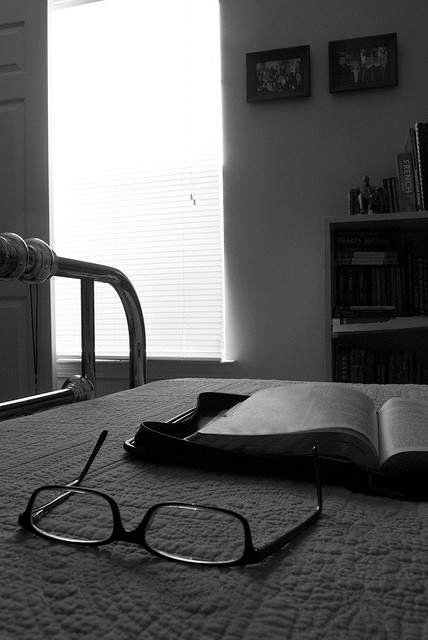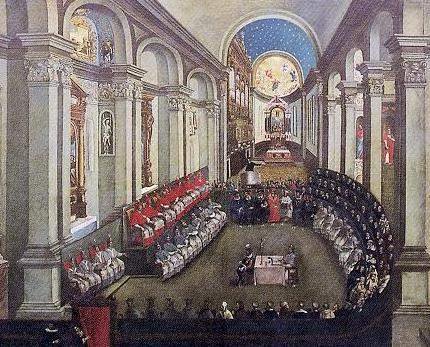 One of the greatest struggles in my journey of faith has been finding a point of authority in matters of faith. Protestants stress sola scriptura as a rule of faith — that Scripture alone is their authority. Especially those Protestants of an evangelical or fundamentalist bent believe that biblical doctrine is clear on the surface of Scripture, without any interpretation. But at once this presents a problem. If Scripture is so clear, and if biblical doctrine is so self-evident, then how do various Christians and various denominations reach such diverse interpretations and such diverse doctrines? And more important, how could I, observing intelligent, rational people supporting each position, and finding merit and value with each, discern between them? What gave me, a man, the authority to dismiss some views as incorrect and declare another the right one?
One of the greatest struggles in my journey of faith has been finding a point of authority in matters of faith. Protestants stress sola scriptura as a rule of faith — that Scripture alone is their authority. Especially those Protestants of an evangelical or fundamentalist bent believe that biblical doctrine is clear on the surface of Scripture, without any interpretation. But at once this presents a problem. If Scripture is so clear, and if biblical doctrine is so self-evident, then how do various Christians and various denominations reach such diverse interpretations and such diverse doctrines? And more important, how could I, observing intelligent, rational people supporting each position, and finding merit and value with each, discern between them? What gave me, a man, the authority to dismiss some views as incorrect and declare another the right one?
This problem perplexed and frustrated me for years. It was the source of unending turmoil, every time I dared approach it. During my time in the wilderness, and especially more recently, I tried on many occasions to study doctrine and theology and Scripture, and determine, once and for all, what it was I actually believed, and therefore what church I belonged in. But I couldn’t do it. Time and time again, I reached an impasse at the point of authority.
After years of beating my head against it, I reached a solution to the problem that satisfied me, I thought. If there was no authority — no point from which to argue that any position was any more correct than any other — then they all must be equally correct. The correctness of doctrine must be relative. If God saves souls and changes lives in a variety of different Christian traditions — and this I observed, and believed, and still believe — then all of our doctrinal differences don’t amount to a drop in a bucket in God’s eyes. It was a position of thoroughgoing ecumenism, or even doctrinal relativism; a belief that all (or at least all orthodox) Christianity was equally valid. One’s choice of a church was merely a matter of preference, of what worked for each person individually. This was comfortable. I learned to respect and value all different Christian traditions, to learn from them and seek to understand them (this is a lesson I hope I never lose). Deep down, though, my position felt empty. If the correctness of doctrine was relative, then ultimately, doctrine was meaningless and inconsequential.
This was the position at which I stood when I began this Catholic journey. I had written at length to myself about the characteristics and values I was looking for in a church, and planned to go “church shopping.” My ideal looked very little like the Catholic Church — at least, not like my preconceived image of the Catholic Church. It was only by a happy accident that I stumbled onto this road. Once again, I don’t believe in happy accidents.
In the very first conversation I had with Audrey about Catholicism — the first time she invited me to Mass — I mentioned to her, off the top of my head, one of the problems I had with Catholicism. It wasn’t even the chief problem, I thought, but one that seemed innocuous enough for an initial conversation. “I don’t like that the Church insists on interpreting Scripture for believers.”
Her response was simple, rational, clear. It made sense. It didn’t sink in at the time that it was the key to unlock my riddle, or that she was the only person who could have answered it for me this way. “I see it like authority for an historian. We base our arguments on authority, on the arguments and interpretations of the past. Each generation builds on what was done before and gains a deeper understanding of the truth. And the Church has 2,000 years of authority behind her interpretation of Scripture.”

As an historian, how do I discover the truth? I go to the source: I take the testimony of the most reliable, most primary sources toward the event in question. But sources don’t speak for themselves. They have to be interpreted. No source says, “This is exactly how it happened, and these are exactly its implications” — if there were such a source, then it, too, would have to be interpreted: Who would have the authority to write in such a way, and how could they be so certain? And so historians, naturally, also look to other interpreters of a source, to understand how that source has been interpreted in the past. Due weight is given to those interpreters who speak from authority — who were closest in time to the event, who knew the people and events and circumstances involved, or whose interpretations were qualified by extensive study or academic credentials. Historians build their interpretations on these older, authoritative interpretations, creating an historiographic, interpretive tradition, with each generation adding to the store of knowledge and furthering their understanding of the truth.
Likewise it is with the Church and Scripture. Protestants may treat the Bible as a contemporary, self-evident source whose meaning is clear to the modern reader; but the truth is that it is an ancient, 2,000-year-old collection of documents. The first step in interpreting it, necessarily, has to be understanding how it was received in its own time — how the first generations following Christ received and understood his words and teachings, and how the faith of the Apostles was passed down. This tradition is the essential context to interpreting Scripture. The Church Fathers — those learned men of the Church’s first centuries — commented on Scripture at length. Their interpretations necessarily have far greater authority than mine, that of a layman 2,000 years departed.

And even more important, the Church itself claims the ultimate authority to interpret Scripture, through the Holy Spirit. The Church, because of who she is, because of the tradition she has inherited, has a far greater authority to interpret Scripture than I do. The Magisterium of the Church — the bishops in communion with the pope, as successors of the Apostles — is alone in a position to speak with true authority.
This kind of claim to authority simply isn’t present in the Protestant world. The Protestant Reformation consciously severed all ties to authority. In most evangelical churches, the highest authority in matters of doctrine and discipline is the local church: authority rests with the pastor or the body of elders. And that person’s authority is only as strong as his personal integrity and ability. If the congregation doesn’t respect it, then its members are free to — and so often do — split away to form their own churches or denominations. Since the Reformation, in the absence of any unifying authority, Protestant churches have splintered into so many thousands of fragments.
But the Catholic Church has the authority to interpret Scripture and Tradition. It has the authority to teach the truth of revelation and doctrine. When my path lacked any definition at all, the Church showed me the marked road, and gave me a compass. And this is key that has at last made sense of my journey.
Leave a comment